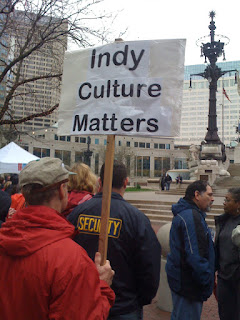 On Monday, there was a rally for the arts on Monument Circle in Indianapolis. It was a crappy day, which suited the state of arts funding in our city--where a forty-eight million dollar deficit due to to the mismanagement of sports venues paid for by taxpayers (unwillingly by many, including me) has taken a big bite from arts funding already diminished by the failing economy. It was nice to see people come out and plead the cause for the arts in the rain--but I left feeling vaguely aggravated and dissatisfied and I didn't quite know why.
On Monday, there was a rally for the arts on Monument Circle in Indianapolis. It was a crappy day, which suited the state of arts funding in our city--where a forty-eight million dollar deficit due to to the mismanagement of sports venues paid for by taxpayers (unwillingly by many, including me) has taken a big bite from arts funding already diminished by the failing economy. It was nice to see people come out and plead the cause for the arts in the rain--but I left feeling vaguely aggravated and dissatisfied and I didn't quite know why.The president and CEO of the Indianapolis Convention & Visitors Association noted that "...the twenty-two million annual visitors to Indianapolis come for a flourishing music, theater and visual arts scene, as well as sports and conferences;" the CEO of WellPoint reminded us that the arts "...enhance the city's national reputation, while pumping tens of millions of dollars into the Central Indiana economy;" the mayor, who cut arts funding severely well before the general economic decline, said, "...people who consider moving to Indianapolis look specifically at cultural institutions such as the Indianapolis Museum or Art and the Indianapolis Symphony Orchestra." The superintendent of schools also spoke of the importance of cultural institutions in providing programs that introduce disadvantaged kids to the arts.
Aside from the mayor's hypocrisy and the focus on the dollars that the arts bring to the city, as opposed to the enrichment the arts bring to our lives, what was to be aggravated about? Everything they said was true. Okay, maybe I was also a little aggravated about the fact that, aside from lovely performances by local musicians and a dancer who braved the elements, no artists' voices were heard. But I understood that. The world is about money and politics--the people who bring in the big bucks have considerable power over the policymakers. The arts desperately need their support, so they get to speak--and it's important that they do.
It wasn't until later, thinking about what the superintendent said, that I identified the source of my dissatisfaction. He spoke of the importance of cultural institutions that provide experiences in the arts for school children, but said not a word (nor did anyone else) about the benefits of people engaging in the arts--as opposed to being "exposed" to them.
As an artist and a teacher, I believe that this is the greatest benefit the arts offer--to anyone, of any age.
There are few things in the world that please me more than watching people engaged in the act of writing. The quality of silence in the room, each person in his own world; the scratching of pens, the tapping of computer keys, the occasional sigh. Even better is the moment when a student's face lights up after writing something she didn't know she knew--and to see that new understanding understanding manifest itself in her behavior and her world view over time.
Writing, dancing, acting, drawing, composing music, it's all the same. You bring every part of yourself to the process of creating another world--and you're a better, smarter, more compassionate person for it. The world is better for it, too.
Sadly, in this culture of The Standardized Test, the arts are considered fluff. Teachers are too busy preparing kids to parrot back answers to questions they're likely to encounter on Test Day to take time for creativity.
But, guess what? There are no answers to any question that really matters. The kind of thinking you have to do in real life exactly mirrors the kind of thinking you do to write a story, compose a piece of music, sculpt a figure. You assess, consider the options, try, fail, try again--and again and again, until you hit upon an inevitably less-than-perfect (but workable) solution.
Engaging in the creative process is not fluff. It's crucial in a million different ways, not the least of which is helping us find our way out of the economic and spiritual morass we're in.
So, yes! Support the arts!
I love museums, I love the theater, I love dance and music. We need them!
But we need more than the opportunity to experience and appreciate the imagination of others. Each of us needs (and deserves) the means to develop and celebrate our own imagination, too, which is essential to being fully, richly human.
2 comments:
A big 'here, here!' to your post. I couldn't agree more. (Especially with the bit about the standardized testing.)
Hey, thanks! This stuff makes me crazy!
Post a Comment